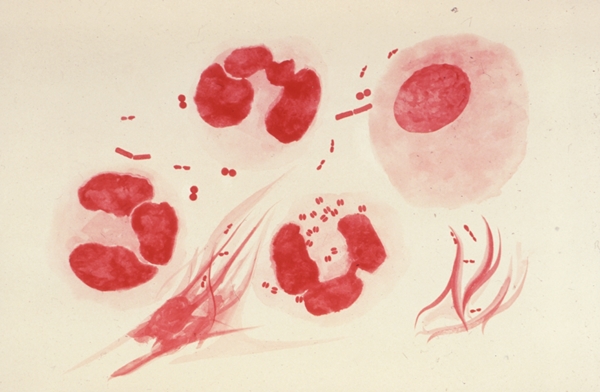22 September 2016. Findings from a clinical trial show a candidate drug kills bacteria causing a type of gonorrhea becoming resistant to current antibiotics. Results of the trial testing the drug code-named ETX0914 made by biotechnology company Entasis Therapeutics are scheduled for presentation tomorrow at the 2016 STD Prevention Conference in Atlanta.
Gonorrhea is a sexually transmitted disease causing infections in the genitals and other regions, which has become common among people ages 15 to 24. Infections from Neisseria gonorrhoeae bacteria are a major cause of pelvic inflammatory disease in the U.S., which can lead to conditions in women such as tubal infertility, ectopic pregnancy, and chronic pelvic pain, as well as promote HIV infection. Centers for Disease Control and Prevention says gonorrhea is the second most reported sexually transmitted disease, with more than 350,000 new cases found in the U.S. during 2014.
The current primary treatment for gonorrhea is a type of antibiotics known as cephalosporins. In recent years, however, the bacteria causing gonorrhea evolved to become more resistant to cephalosporins, creating a need for new drugs to combat the disease. One of those new drugs is ETX0914, developed as an alternative to cephalosporins.
Entasis Therapeutics is a spin-off company from drug maker AstraZeneca, founded last year in Waltham, Massachusetts and given the rights to AstraZeneca’s small molecule, or low molecular weight, anti-infection drug candidates, including ETX0914. Entasis uses what it calls non–culture-based diagnostic testing to identify specific targets among drug-resistant bacteria for new antibiotics. ETX0914 is the only one of 4 Entasis antibiotics in development to reach beyond early-stage trials.
This intermediate-stage clinical trial tested ETX0914 among 179 individuals age 18 to 55 with urethral or cervical gonorrhea. The study was conducted by National Institute of Allergy and Infectious Diseases, part of National Institutes of Health, and led by Stephanie Taylor, professor of microbiology at Louisiana State University medical school in New Orleans. Taylor is scheduled to report the findings at tomorrow’s meeting.
Participants in the trial — 167 men and 12 women — were randomly assigned to receive oral ETX0914 doses of 2 or 3 grams, or injections of a cephalosporin antibiotic. The study team looked primarily for the clearance of infections in the affected regions after 6 days, and reports of adverse effects within 31 days after treatment.
The results show all 47 participants receiving 3 grams of ETX0914, and nearly all — 48 of 49 individuals — receiving 2 grams, were cured of their gonorrhea infections. Some 21 of the 179 participants reported adverse side effects, characterized as mild and primarily gastrointestinal.
Entasis expects to begin a late-stage clinical trial of ETX0914 in 2017. The company says FDA is giving the drug fast-track designation that offers accelerated review of treatments with a potential to address serious conditions or unmet medical needs. With fast-track status, FDA schedules more frequent meetings, and allows for more frequent correspondence, partial submissions, and rolling review of a company’s new-drug or biological license applications.
Read more:
- Clinical Trial Testing Live Bacteria as Acne Treatment
- Small Business Grant Funds Flu Therapy R&D
- Synthetic Biotech Research Microbe Developed
- University Spin-Off Developing Sepsis Drug
- Genome Engineering Streamlines E. Coli DNA
* * *


 RSS - Posts
RSS - Posts
You must be logged in to post a comment.